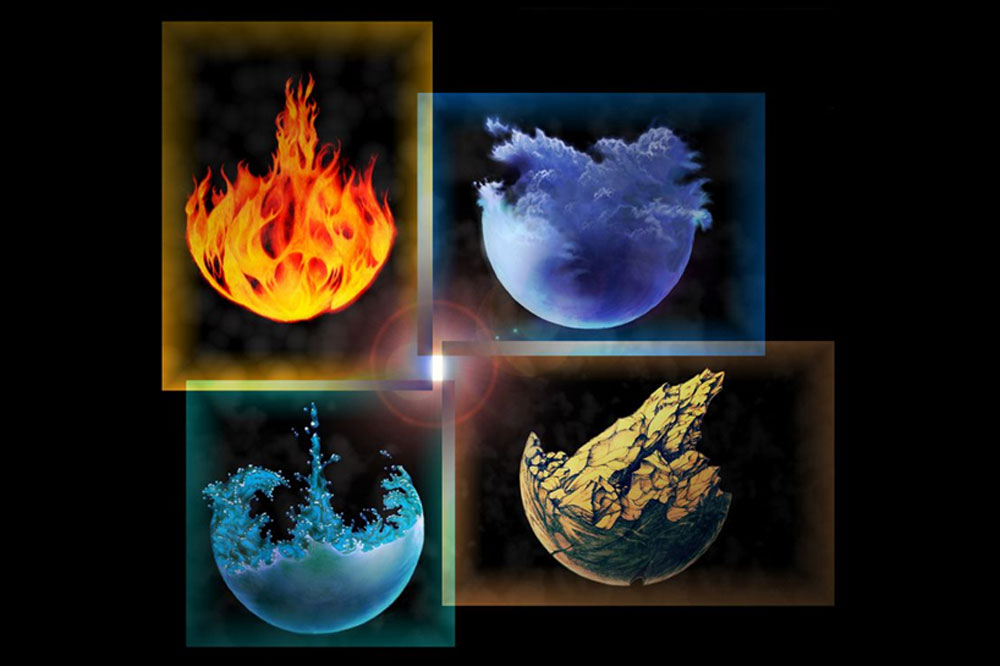A growing body of research is slowly revealing the wellbeing secrets of the four elements – now we can harness their power. We can take inspiration from earth, wind, fire, and water to discover the science-backed ways they can improve our mood and boost our wellbeing. Lying on a beach, strolling through woods, enjoying a blustery walk, or snuggling up in front of a roaring fire – these activities can instantly make us feel better. But have you ever stopped to wonder why? Or what you can do to recreate those feelings?
Earth: When we talk about earth, we don’t just mean soil – although any toddler will tell you making mud pies is a mood-booster! Earth refers to spending time in nature, enjoying green spaces, or exercising outdoors. And there’s plenty of evidence to show this element is vital for our health. It’s known to reduce stress, raise self-esteem, lower blood pressure, tackle depression, prevent negative thoughts, boost our immune system, and even push us to exercise harder than we would do in a gym. But you don’t have to spend all your free time outdoors to feel the benefits. One study, by the University of Exeter, found that spending just two hours a week in nature is linked to feeling healthier and happier. “You can spread it over the course of a week or get it all in a single dose, it doesn’t really matter,” says lead author Mathew White. Even better, “just sitting on a bench will do,” adds Mathew. Sounds like the perfect excuse for a coffee break in the park.
Air: The Dutch have an expression, uitwaaien, which doesn’t have a direct translation but means spending time in wild, windy weather, usually on a walk or bike ride. The idea is to replace ‘bad air’ with ‘good air’, leaving you refreshed and less stressed – we’d probably say to ‘blow away the cobwebs’. While a gusty walk along the seafront is great, it’s not something we can all do (and depends on the infamous British weather), so how else can you harness this element? Air can also mean the breath, and tuning-in to the power of our breath has a number of mind-body benefits. Breathing properly – rather than taking shallow breaths – sends signals to the brain, via the vagus nerve, that we’re safe, and this reduces levels of stress hormones in the body that, in turn, eases feelings of anxiety and panic. Fancy a simple breathing exercise? Take a breath in for a count of two, pause for two, then exhale for two – the pause helps keep your attention on the breath. When this feels comfortable, lengthen the exhalation. This helps reset our system, bringing it out of threat response (fight/flight/freeze) and back to “rest and digest”, sending signals of calm and safety cascading through our body. Do this exercise without judgment, and with as much compassion as possible; when we’re anxious, we don’t need another ‘thing’ to worry about!
Fire: Many of us may already use a candle for meditation – focusing on the flame can help improve concentration – while watching a fire burn is the perfect way to unwind. Now researchers say this relaxation response is a throw-back to our ancient ancestors. A study published in the journal Evolutionary Psychology revealed watching fire can reduce our blood pressure – and the longer we watch, the more relaxed we become. The experience seems to make us more sociable, too (which would’ve helped create strong friendship and family bonds). In fact, the study was done using videos of fire, rather than the real thing, so look for clips of crackling fires on YouTube to chill out like a caveman. Saunas are another great way to get your fire going. Evidence shows they can help lower blood pressure, reduce our risk of heart disease and dementia, improve lung function, relieve painful joints, and boost your immunity. Using fire as an element can also mean enjoying the effects of sunlight. We know our bodies create vitamin D via the sun’s rays on the skin, but sunshine can also create serotonin, the ‘happy hormone’, in the brain. An Australian study that measured levels of brain chemicals found people had higher serotonin levels on clear sunny days compared with cloudy days. This was true whether it was summer or winter, so get outside whenever the sun appears, to lift your mood.
Water: Can you remember your excitement at seeing the sea as a child? There’s more to that feeling of joy than simply knowing you could play on the beach. Research by the European Centre for Environment and Human Health found that not only do we prefer the seaside compared with other outdoor settings, but also spending time on the coast is more likely to create a sense of wellbeing. This mood-boosting effect could be due to negative ions, which are created by the pounding waves. These tiny, electronically charged, particles can help relieve stress, anxiety, depression, and insomnia. We’re more active when we live by the coast, too. In 2014, a team from the University of Exeter discovered that people who live near the sea were more likely to hit the weekly activity guidelines than those who live inland. In a later study, the team found living by the seaside was linked to better mental health. There are several reasons for this, such as exercise helping to tackle anxiety and depression, but it could be that being near water has a restorative effect on the body and brain. We have a deep evolutionary connection to water. For starters, our bodies are 70–80% water, so without water we literally couldn’t exist! It’s also thought that humans evolved from water creatures millions of years ago, so it’s not surprising so many of us feel the therapeutic effects of water, from swimming to listening to waves, or rainfall via an app. Water-based activities such as cold showers, taking a bath twice a week, wild swimming, or simply drinking more water, promote relaxation, stress relief, and help strengthen the immune system.
Whatever activity you choose to do, always try to do it outdoors. Nature can play an important role in helping us heal, particularly when it comes to mental and emotional health issues related to our fast-moving, digital lifestyles. Being in nature, getting inspired by the elements, helps us reconnect with ourselves and what it really means to be human.




